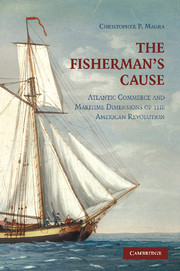Book contents
- Frontmatter
- Contents
- Acknowledgments
- Abbreviations
- Introduction
- Part One THE RISE OF THE COLONIAL COD FISHERIES
- Part Two ATLANTIC ORIGINS OF THE AMERICAN REVOLUTIONARY WAR
- 4 Cod and the Atlantic Economy
- 5 Atlantic Business Competition and the Political Economy of Cod: Part One
- 6 Atlantic Business Competition and the Political Economy of Cod: Part Two
- 7 The New England Trade and Fisheries Act
- Part Three THE MILITARY MOBILIZATION OF THE FISHING INDUSTRY
- Index
- References
7 - The New England Trade and Fisheries Act
Published online by Cambridge University Press: 03 July 2009
- Frontmatter
- Contents
- Acknowledgments
- Abbreviations
- Introduction
- Part One THE RISE OF THE COLONIAL COD FISHERIES
- Part Two ATLANTIC ORIGINS OF THE AMERICAN REVOLUTIONARY WAR
- 4 Cod and the Atlantic Economy
- 5 Atlantic Business Competition and the Political Economy of Cod: Part One
- 6 Atlantic Business Competition and the Political Economy of Cod: Part Two
- 7 The New England Trade and Fisheries Act
- Part Three THE MILITARY MOBILIZATION OF THE FISHING INDUSTRY
- Index
- References
Summary
The Fishery on the Banks of Newfoundland, and the other Banks, and all the others in America, was the undoubted right of Great Britain. Therefore we might dispose of them as we pleased.
On February 10, 1775, Prime Minister and Chancellor of the Exchequer Frederick North “moved for leave” in Parliament to introduce “a Bill for putting the trade of America with England, Ireland, and the West Indies under temporary restrictions, and for restraining the refractory provinces from fishing on the banks of Newfoundland.” Dissenting heads of the British state who were among the first to read copies of the bill were very concerned. In the House of Commons, Sir John Griffin “after expressing his sincere wishes to see a happy conclusion put to the American disputes without bloodshed, declared, that upon reading the Bill, he felt himself alarmed, and was jealous that, if the greatest caution and delicacy was not to be used in perfecting the Bill, it would rather provoke than effect any good purpose.” When the bill made it to the House of Lords, peers such as Charles Prat, Earl of Camden, a Whig and the judge who acquitted John Wilkes, compared the Bill to other Parliamentary legislation aimed at America. Lord Camden found that other laws were “by no means so violent in their operations as this.” He believed that the bill “was at once declaring war [against the colonies], and beginning hostilities in Great Britain [i.e. the British Empire].”
- Type
- Chapter
- Information
- The Fisherman's CauseAtlantic Commerce and Maritime Dimensions of the American Revolution, pp. 142 - 158Publisher: Cambridge University PressPrint publication year: 2009



